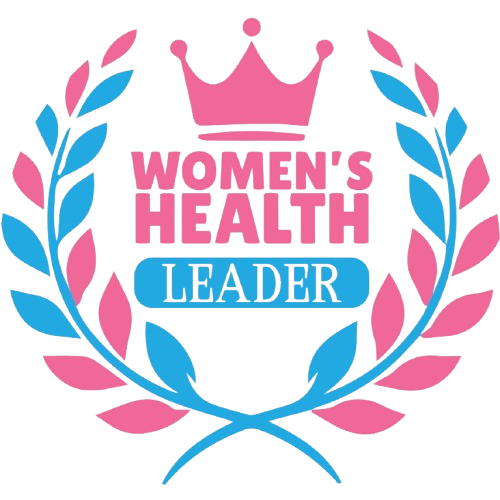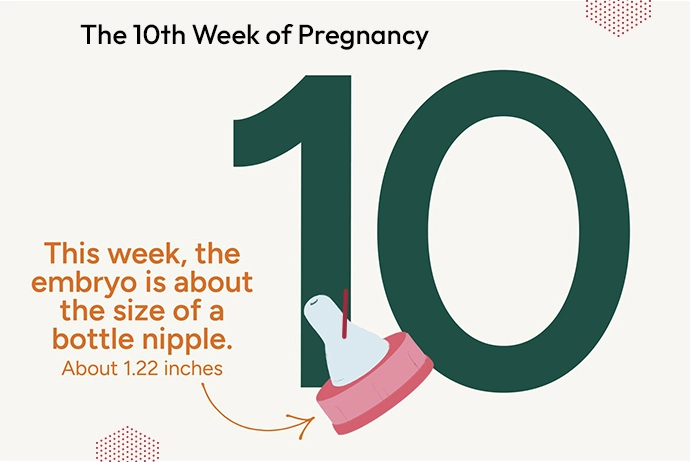
Dr. Aruna Ashok MBBS, MS OG, DNB OG
- Clinical Director


Congratulations! You've reached the 10th week of pregnancy. This is an exciting milestone where the fetus's heartbeat can reach up to 180 beats per minute (BPM). Imagine the rapid thumping, like a tiny drum, signaling vibrant life inside you. At this stage, your baby is about the size of a kumquat, measuring around 1.2 inches and weighing less than a quarter of an ounce.
During week 10, critical developments occur. The embryo officially transitions to a fetus, marking the end of the embryonic stage. Major organs such as the brain, kidneys, and liver are rapidly maturing. The head, still quite large in proportion, houses the developing brain, which is forming neural connections at a remarkable pace. Tiny buds on the fetus’s body will grow into arms and legs. Moreover, fingers and toes are becoming more defined. The placenta is also functioning at full capacity, providing the fetus with nutrients and oxygen.
With the heart beating strongly, you might be curious about hearing it. Many obstetricians use a Doppler device to detect the heartbeat during prenatal visits. Hearing that fast, rhythmic sound for the first time can be a profoundly emotional moment, reinforcing the reality of the new life growing inside you.
It's natural to have mixed emotions. Excitement, anxiety, and curiosity are all part of this beautiful journey. Each heartbeat you hear is a reassurance that your baby is developing well. While the journey is still early, these weekly milestones are stepping stones to your eventual motherhood. Remember, every sensation and symptom you experience is a part of your body’s remarkable process of creating life.
As you navigate through week 10, keep in mind that you're not alone. Make sure to share your thoughts with your partner friends. Their support can make this experience even more special. And do not hesitate to reach out to your healthcare provider. They are there to guide you through this amazing journey.


Week 10 of pregnancy brings a myriad of symptoms as your body adapts to the growing fetus. One of the most common symptoms is morning sickness. It can occur at any time of the day. This is despite its name. Nausea and vomiting are triggered by the pregnancy hormone hCG. Eating small and frequent meals can be helpful. Also, staying hydrated can help manage these symptoms.
Fatigue is another hallmark of early pregnancy. Your body is working overtime to support the developing baby, which can leave you feeling more tired than usual. Ensure you get plenty of rest. You can listen to your body's signals. It's okay to take naps or go to bed earlier than usual.
The changes in body hormones can also lead to mood swings. You might find yourself feeling elated one moment and tearful the next. These emotional fluctuations are perfectly normal but can be challenging. Practicing relaxation techniques can be helpful. This includes deep breathing or prenatal yoga, can help maintain emotional balance.
Breast tenderness and enlargement are also common as your body prepares for breastfeeding. Wearing a supportive bra can alleviate discomfort. Additionally, you might notice increased urination due to the expanding uterus pressing on your bladder.
Some women experience food aversions or cravings. It's important to eat a balanced diet and give in to cravings occasionally, as long as they are healthy. Avoid harmful substances like alcohol, caffeine, and certain seafood high in mercury.
Another symptom you may encounter is slight abdominal cramping or bloating. This can be due to the stretching of your uterus. However, if you experience severe pain or bleeding, contact your healthcare provider immediately.
As you navigate these symptoms, remember that they are temporary and a sign that your body is nurturing new life. Each symptom is a step closer to meeting your baby. Keep a journal of your experiences. It can be a comforting way to track your journey and share it with your child in the future.
Understanding these symptoms can make them easier to manage. Talk to other moms, join pregnancy forums, or attend support groups. Sharing your experiences with others going through the same thing can be incredibly reassuring. And always feel free to discuss any concerns with your obstetrician. They can provide personalized advice and reassurance.
Eating a balanced diet is crucial during pregnancy, especially in week 10 when your baby's organs are rapidly developing. Focus on nutrient-rich foods that support both your health and the baby's growth.
Start with protein-rich foods like lean meats, poultry, fish, eggs, and legumes. Protein is essential for the development of your baby's tissues and muscles. Aim for about 70 grams of protein daily. Incorporate a variety of sources to keep your meals interesting and nutritious.
Fruits and vegetables should be a staple in your diet. They provide essential vitamins, minerals, and fiber. Leafy greens like spinach and kale are rich in folic acid, which is crucial for preventing neural tube defects. Fruits like oranges and strawberries are high in vitamin C, aiding in the absorption of iron and boosting your immune system.
Whole grains are another important component. Foods like brown rice, whole wheat bread, and oatmeal provide necessary carbohydrates for energy and are packed with fiber to help with digestion. Fiber can also help manage pregnancy-related constipation.
Dairy products are vital for calcium intake, which supports your baby's developing bones and teeth. If you're lactose intolerant or prefer non-dairy options, consider fortified plant-based milks like almond or soy milk.
Hydration is key. Aim to drink at least 8-10 glasses of water a day. Staying hydrated helps with nutrient transport, waste elimination, and maintaining amniotic fluid levels.
Certain foods should be limited or avoided during pregnancy. Reduce your intake of caffeine, as it can affect fetal development. Avoid raw or undercooked meats, fish with high mercury levels, and unpasteurized dairy products to prevent foodborne illnesses.
Taking prenatal vitamins is essential. They ensure you receive adequate folic acid, iron, and other nutrients that might be hard to obtain through diet alone. Consult with your obstetrician to choose the right prenatal vitamin for you.
Eating well doesn't have to be complicated. Plan your meals ahead of time, incorporating a variety of food groups. Simple, nutritious snacks like yogurt, nuts, and fresh fruit can keep you energized throughout the day.
Cooking at home allows you to control ingredients and portions, making it easier to stick to a healthy diet. Experiment with new recipes to keep your meals exciting. Involve your partner in meal planning and preparation. It can be a fun way to bond and ensure you both stay healthy.
Remember, every bite you take nourishes both you and your baby. Making mindful food choices now sets the foundation for a healthy pregnancy and beyond. If you have any dietary restrictions or concerns, talk to a nutritionist or your healthcare provider for personalized advice.
Counseling during pregnancy, especially around the 10th week, can be incredibly beneficial for both your emotional and physical well-being. This period is marked by significant changes and can bring about a variety of emotions, from joy and excitement to anxiety and fear. Having someone to talk to can make a huge difference.
Prenatal counseling provides a safe space to express your feelings and concerns. Whether you're a first-time mom or have been through pregnancy before, each experience is unique. Counseling can help you navigate these changes, offering strategies to manage stress and anxiety.
One common topic in prenatal counseling is managing expectations. Many women feel pressure to have a perfect pregnancy and to bond with their baby immediately. Counseling can help you understand that it's normal to have a range of emotions and that bonding can take time.
Another important aspect is relationship counseling. Pregnancy can affect your relationship with your partner. Counseling can help you communicate better, understand each other's perspectives, and strengthen your bond. It’s essential to support each other through this journey.
Counseling also covers practical advice, such as preparing for childbirth and parenting. It can include information on what to expect during labor, pain management options, and breastfeeding tips. Being informed can alleviate fears and help you feel more prepared.
For those dealing with pregnancy loss or complications, counseling provides crucial support. It can help you process grief, navigate medical decisions, and find ways to move forward. No matter the situation, having a professional to guide you through these difficult times is invaluable.
At A4 Fertility Centre, we offer comprehensive birthing classes that include counseling sessions. These classes are designed to support you through every stage of pregnancy. Our expert counselors are here to listen, provide guidance, and help you build confidence in your journey to motherhood.
Group counseling is another option. Joining a group of other pregnant women can provide a sense of community and shared experience. It’s comforting to know that others are going through similar challenges and joys. These groups often form lasting friendships that continue into parenthood.
Remember, seeking counseling is a sign of strength, not weakness. It's about taking proactive steps to ensure your well-being and that of your baby. It’s normal to need support, and it’s okay to ask for help.
If you're unsure where to start, talk to your obstetrician. They can recommend a counselor or connect you with local resources. Many healthcare providers offer in-house counseling services or can refer you to trusted professionals.
Your mental health is just as important as your physical health during pregnancy. By seeking counseling, you’re investing in a healthier, happier pregnancy. Don’t hesitate to reach out and take advantage of the support available to you. You deserve to feel supported and empowered on this journey.
In the 10th week of pregnancy, several important tests can help ensure both your health and the baby's. These tests provide critical information about your baby's development and can detect any potential issues early on.
One of the key tests during this period is the first-trimester screening. This includes a blood test and an ultrasound. The blood test measures levels of specific substances in your blood, such as hCG and PAPP-A. The ultrasound, known as a nuchal translucency scan, measures the clear space in the tissue at the back of your baby's neck. Abnormal results might indicate an increased risk of chromosomal conditions like Down syndrome.
Your obstetrician might also recommend a Non-Invasive Prenatal Test (NIPT). This blood test analyzes fetal DNA in your blood to screen for chromosomal abnormalities. It's highly accurate and poses no risk to the baby. NIPT can be done as early as week 10 and is particularly recommended for women over 35 or those with a family history of genetic disorders.
A routine part of prenatal care is the complete blood count (CBC) test. This test checks for anemia by measuring your levels of red blood cells, hemoglobin, and hematocrit. Anemia is common in pregnancy and can be managed with diet or supplements if detected early.
Blood pressure monitoring is another crucial aspect of your prenatal visits. High blood pressure can lead to complications such as preeclampsia. Regular monitoring helps ensure it remains within a healthy range.
Urine tests are also performed to check for urinary tract infections, protein levels, and glucose levels. High levels of protein can be an early sign of preeclampsia, while glucose levels can indicate gestational diabetes.
Genetic carrier screening is an optional test that can be done during this time. It checks if you and your partner are carriers of certain genetic conditions, like cystic fibrosis or spinal muscular atrophy. Knowing this information can help you make informed decisions about your pregnancy.
Ultrasounds play a significant role in monitoring your baby's development. The 10-week ultrasound can provide a detailed look at your baby's growth and heartbeat. It's a wonderful opportunity to see your baby and can be a very reassuring experience.
At A4 Fertility Centre, we prioritize comprehensive prenatal care, including all necessary tests. Our birthing classes provide detailed information about these tests, helping you understand their purpose and what to expect. Our goal is to ensure you feel informed and supported throughout your pregnancy.
Remember, each test is a step towards ensuring a healthy pregnancy. Don't hesitate to ask your healthcare provider any questions you may have about these tests. Understanding why they are done and what they involve can ease any anxiety you might have.
Taking care of your health is the best way to take care of your baby. By staying informed and attending all your prenatal appointments, you're ensuring the best possible start for your little one. Your healthcare team is there to support you every step of the way, providing the care and information you need to feel confident and prepared.